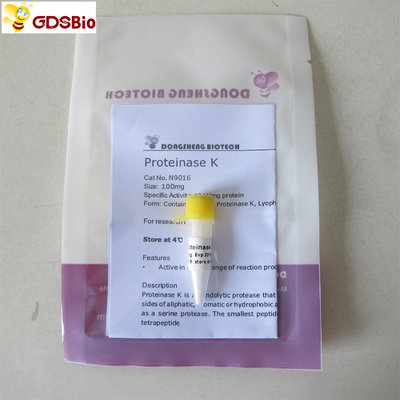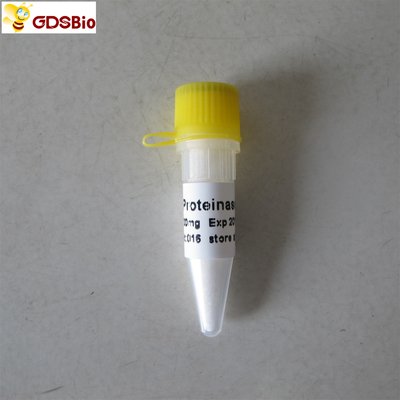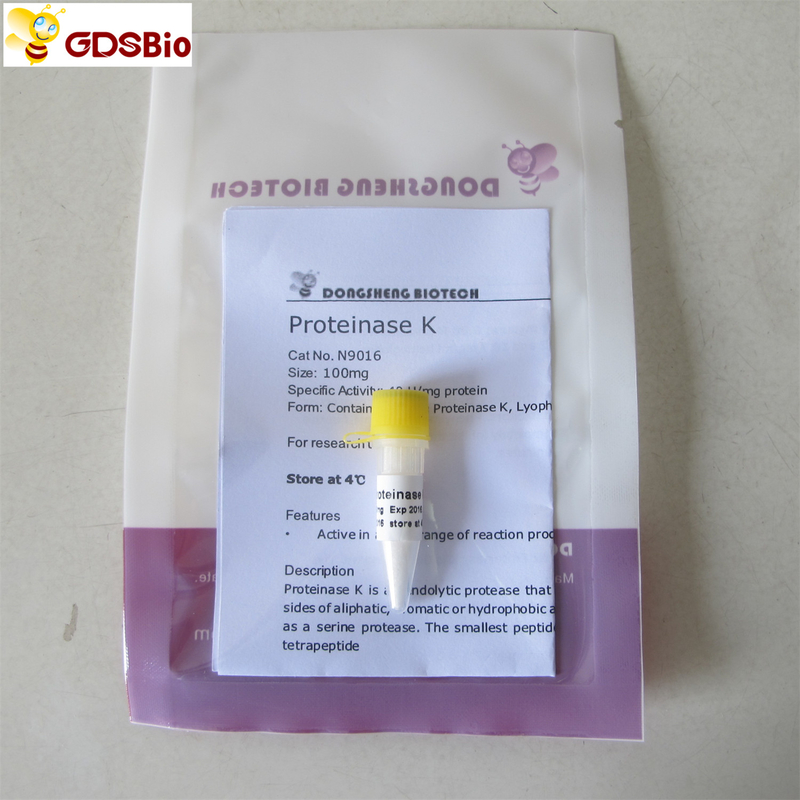Proteinase K Powder N9016 Molecular Biology Grade In Vitro Diagnostic Products
Product Details:
| Place of Origin: | China |
| Brand Name: | GDSBio |
| Certification: | / |
| Model Number: | N9016 |
Payment & Shipping Terms:
| Minimum Order Quantity: | 1 bag |
|---|---|
| Packaging Details: | small package or bulk distribute or OEM |
| Delivery Time: | 8work days |
| Payment Terms: | L/C, D/A, D/P, T/T, Western Union, MoneyGram |
| Supply Ability: | 100 Bag/Bags Per Day |
|
Detail Information |
|||
| Cat. No.: | N9017 | Size: | 100mg |
|---|---|---|---|
| Concentration: | Contains Proteinase K (≥95%) | Appearance: | White Powder |
| Group: | In Vitro Diagnostic Products | Specific Activity: | ≥30 U/mg Protein |
| Logo Printing: | With Logo Printing | Transport Package: | Packing |
| Production Capacity: | 100 Bag/Bags Per Day | Storage Conditions: | Store At -20°C |
| High Light: | N9016 In Vitro Diagnostic Products,Molecular Biology Grade In Vitro Diagnostic Products,proteinase k buffer |
||
Product Description
Proteinase K Powder
Molecular Biology Grade,For Research Use Only
Cat No. N9016
Size: 100mg
Specific Activity: ≥30 U/mg protein
Form: Contains proteinase K (≥95%), lyophilized powder
Components
| Component | N90116 |
|
Proteinase K Powder |
100mg |
Storage
-20ºC recommended. The shelf life of proteinase K lyophilized powder is three years when stored sealed and dry below 4ºC. Proteinase K lyophilized powder is shipped at room temperature.
Description
Proteinase K is an endolytic protease that cleaves peptide bonds at the carboxylic sides of aliphatic, aromatic or hydrophobic amino acids. The Proteinase K is classified as a serine protease. The smallest peptide to be hydrolyzed by this enzyme is a tetrapeptide.
Features
• Recombinant proteinase K
• Active in a wide range of reaction products
Applications
• Isolation of genomic DNA from cultured cells and tissues
• Removal of DNases and RNases when isolating DNA and RNA from tissues or cell lines
• Determination of enzyme localization
• Improving cloning efficiency of PCR products
Quality Control
DNase Activity: None detectable enzyme activity after 6 hrs incubation with λ DNA at 37ºC.
RNase Activity: None detectable ribonuclease activity after 16 hrs incubation with RNA at 25ºC.
Source
From yeast cells with cloned gene encoding genetically engineered Engyodontium album (Tritirachium album) endolytic protease.
Molecular Weight
29.3 kDa monomer.
Definition of Activity Unit
One unit of the enzyme liberates Folin-positive amino acids and peptides corresponding to 1 µmol tyrosine in 1 min at 37°C , pH 7.5 using denatured hemoglobin as substrate.
Enzyme activity is assayed in the following mixture: 0.08 M potassium phosphate (pH 7.5), 5 M urea, 4 mM NaCl, 3 mM CaCl2 and 16.7 mg/ml hemoglobin.
Preparation Instructions
Stock solution can be prepared as 40-80mg/ml in dilution buffer [20 mM Tris-HCl (pH 7.4), 1 mM CaCl2] or [20 mM Tris-HCl (pH 7.4), 1 mM CaCl2, 2% Glycerol], sterilized using 0.22μm filter and supplied at final concentration of 20-40mg/ml in 50% Glycerol. Store in aliquots at wide temperature range from 24ºC to -80ºC.
PES and PVDF membranes with low protein binding are recommended in sterile filtration.
Inhibition and Inactivation
Inhibitors: Proteinase K is not inactivated by metal chelators, by thiol-reactive reagents or by specific trypsin and chymotrypsin inhibitors. Phenylmethylsulfonyl fluoride and diisopropyl phosphorofluoridate completely inhibit the enzyme.
Inactivated by heating at 95°C for 10 minutes.
Note
• Optimum activity at 50-55°C.
• Rapid denaturation of enzyme occurs at temperatures above 65°C.
• The recommended working concentration for Proteinase K is 0.05-1 mg/ml. The activity of the enzyme is stimulated by 0.2-1% SDS or by 1-4 M urea.
• Ca2+ protects Proteinase K against autolysis, increases the thermal stability and has a regulatory function for the substrate binding site of Proteinase K.
• Stable over a wide pH range: 4.0-12.5, optimum pH 7.5-8.0.
![]()

Dongsheng Biotech offers different series of products to help you achieve PCR success. For enzymes, our Taq Polymerase, HS Taq DNA Polymerase, FS Taq DNA Polymerase, Pfu DNA Polymerase and Fusion Pfu DNA Polymerase provide high fidelity, efficient, sensitivity PCR performance. We also have Long Taq DNA Polymerase for long PCR performance.







